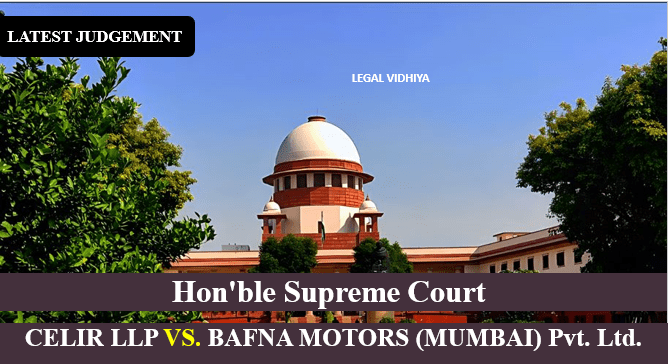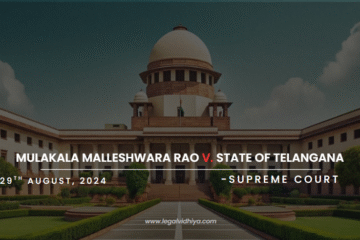
| CITATION | 2023 105 SC |
| DATE OF JUDGMENT | 21ST September 2023 |
| COURT | Supreme Court India |
| APPELLANT | Celir LLP |
| RESPONDENT | Bafna Motors(Mumbai) Pvt. Ltd. |
| BENCH | CJI D.Y Chandrachud & Justice J.B Pardiwala |
INTRODUCTION
It was decided that, in accordance with the revised Section 13(8) of the SARFAESI Act, 2002, a borrower’s right to redeem the secured asset expires on the day that Rule 9(1) of the SARFAESI Act, 2002 publishes the notice for public auction.
FACTS OF THE CASE
On July 3, 2021, the bank (Respondent 3) granted the borrowers (Respondent 1) a loan in exchange for which the bank approved a Lease Rental Discounting (LRD) credit facility in the amount of Rs. 100 Crore in the borrower’s favor, with Respondent 2 serving as guarantor. Rs. 65 Crore of the total loan amount approved was deducted from the then-existing LRD facility provided by the prior bank. Over a plot of land, a security in the shape of a straightforward mortgage was formed for the remaining Rs. 35 crore. The bank made the decision to auction the secured asset since the borrower and the guarantor were unable to pay back the remaining balance of the loan.
ISSUE RAISED
The Supreme Court examined the changes brought to Section 13(8) of the SARFAESI Act by the 2016 amendments to engage with the following issue: till when is a borrower’s right to redeem preserved in an auction sale held under the SARFAESI Act?
CONTENTIONS OF APPELANT
The appellant contended that because the auction proceedings had reached a definitive stage, the High Court was ineligible to consider the writ case filed by the borrowers. They further submitted that as per the amended provisions of Section 13(8) of the SARFAESI Act, 2002, the right of the borrower to redeem the mortgage expired upon publication of the auction notice. According to the appeal, the High Court disregarded the bank’s legal obligations under Security Interest (Enforcement) Rules, 2002, specifically under Rules 9(2) and 9(6) to issue a Sale Certificate to the appellant and therefore could not have consented to the borrower’s plea of redemption before the High Court.
CONTENTIONS OF RESPONDENT
The respondents argued that Section 13(8) of the SARFAESI Act, 2002, which addresses the Enforcement of Security Interest, was correctly construed by the High Court. The right to redemption is not mentioned at all in this provision. It was asserted that in this case, the mortgagor’s right to redeem the property until it was conveyed or transferred to a third party must be invoked under Section 60 of the Transfer of Property Act, 1882.
JUDGEMENT
The Hon’ble Supreme Court granted both of the appeals that the Appellant [Auction Purchaser] filed. It concluded that the High Court had no jurisdiction under Article 226 of the Constitution to exercise its writ, especially since the borrowers had already taken advantage of the alternative remedy provided by the SARFAESI Act. Additionally, the amended provisions of the SARFAESI Act make it evident that the borrower’s right to redeem the secured asset is terminated on the date the notice of the public auction is published.
CONCLUSION
The Bank’s actions in not issuing the Sale Certificate to the Auction Purchaser even after receiving the auction bid price were against the law and this Honorable Court’s legally enforceable rulings. It negated the goal of the laws, which were specifically passed to benefit the general public and ensure a prompt recovery of the debt owed to the banks.
REFERENCE
This Article is written by Prazzal Mohanty student of SOA National Institute of Law, BBSR; Intern at Legal Vidhiya.




0 Comments